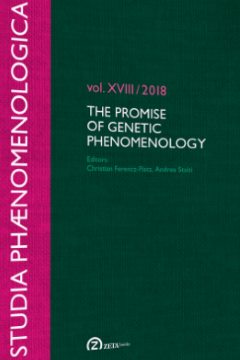Repository | Journal | Volume | Articles

(2018) Studia Phaenomenologica 18.
Die Verteilung und Fortpflanzung der Affektion in der Wahrnehmung nach Husserl
Honghe Wang
Affection in perception does not exhaust itself in a single subjective act of turning-towards (Zuwendung) an object. Husserl’s analyses of the propagation of affection in perception (in Hua XI), which have not been systematically or thoroughly thematized up until now, offer a much more complex picture of affection, which this article brings to the fore. The affective power distributes itself irregularly in perception. The differentiation of perceptual field into foreground and background (first section) prepares the field for the investigation of the distribution of affections (second section). This investigation leads from lower to higher levels of constitution, from simple to complex relations, and from sensations of the lived body to egological factors. In the third section, three directions of propagation of affection and, collectively, six modes of affective awakening are thoroughly analyzed. I end with a discussion of a recent critique of Husserl’s “abstract” approach to affection, which seeks to offer an insight into how a complete theory of affection would look like.
Publication details
Full citation:
Wang, H. (2018). Die Verteilung und Fortpflanzung der Affektion in der Wahrnehmung nach Husserl. Studia Phaenomenologica 18, pp. n/a.
This document is unfortunately not available for download at the moment.


